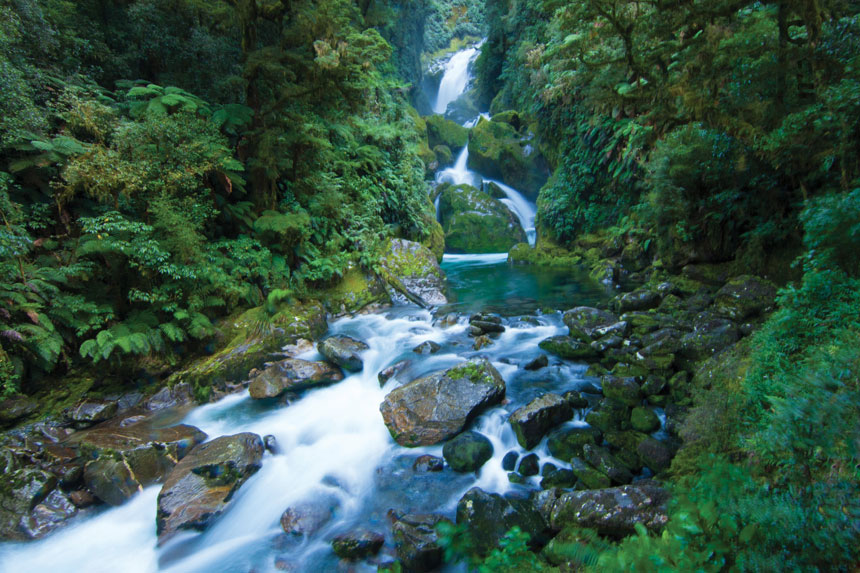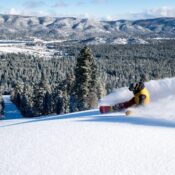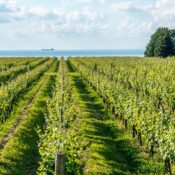In New Zealand, place names drip from J.R.R. Tolkien’s fountain pen — Elfin Bay, Lake Truth, Mount Aspiring, Demon Trail, The Tower — and Lord of the Rings fans now pilgrimage to sets for Middle-earth. But the fans don’t know what I know: Hobbits really do live in New Zealand. And they saved my life.
Long ago I joined a backpacking buddy to hike the fabled Milford Track, the 33-mile trail that zigzags along glacier-cut valleys, through primeval rain forests, among craggy alps, up nearly 4,000 feet to a pass, and back down to the drizzly fiord that is Milford Sound. Aaron — blond, bearded, and buffed after working five months in Antarctica — had planned our quest.
Before our odyssey began, a campground manager scrutinized us. “It rains here,” he warned, shaking his head and handing us a Fiordland National Park flyer.
The Milford Track, it said, receives some of the “heaviest rainfall in the world” — 276 inches. Twenty-three feet of rain. I’m a California native. “Rain” to me is a foot per year. Twenty-three feet is 23 years’ worth of rain.
Twenty inches of rain, the flyer said, could fall in a single day: “Fording of flood waters over 40 inches deep is common.”
Aaron shrugged. “It’s sunny today,” he said. I realized my folly: I had come from California sunshine to join a trip selected by a man who had just spent half a year within 850 miles of the South Pole.
In the morning, under fairy-tale blue skies, a launch carried us past Patience Bay, Welcome Point, and Safe and Happy Coves to the end of a serpentine arm of Lake Te Anau — and to the trailhead below the Disappearing Peaks.
Deep into the forest we ventured. The scent of dampness and decomposing leaves filled the air. Ferns brushed our jeans, and gnarled trees clothed in moss reached down toward us as we traipsed the dirt path beside the river.
After 5 miles we entered the rough-hewn dormitory where we would unroll our sleeping bags.
“Yanks,” declared a New Zealander stirring his chicken soup as we removed our packs.
“Yes, how did you know?” I asked.
His friends laughed. “Blue jeans.” They wore woolen pants and shirts. He motioned toward another brochure on the wall.
“Trampers,” it said, should wear “strong trousers — certainly not tight jeans.… Follow the example of New Zealand’s 60 million sheep: wear wool.”
The next morning we hiked along the west branch of the river below Castle Mountain. Black clouds topping misty mountains released torrents. Rain blustered into my face and down my back, drenching my clothing.
At a narrow wash filled with a rushing stream, I stepped into depths past my hips and dunked my pack like a doughnut. I frantically grasped branches and Aaron’s hand, but creek water splashed under my jacket and met icy perspiration. My hair stuck to my head.
On the far bank I ate soggy bread and shivered. Aaron looked back at the stream. “I guess that’s what the flyer meant,” he shouted.
New waterfalls slashed green tapestry canyon walls until it seemed that a wizard had laid a curtain of gauze across the textured cliffs. In the valley waterfalls became streams, then rivers.
I shuddered. My freezing jeans were shrinking.
We came to a 40-foot-wide torrent of brown water surging over boulders. We started into the river, but I couldn’t keep my balance and felt like something — or someone — was dragging me under the rushing water. We retreated.
I collapsed onto a rock. Aaron paced along the bank and then sat down. The man from the Antarctic deep-freeze was shivering.
I knew that farther along the trail lay Danger Mountain and Terror Peak. I sank my head into my hands, and a puddle on top of my hood poured down my face.
“Don’t worry!” a voice close behind me shouted cheerfully. “We’ll get you across.”
We turned to see six short male figures wearing hooded jackets, tan knee-length shorts, and dun rucksacks emerging from the gray mist. We could see locks of brown, curly hair and pale faces under their deep hoods. And they had very large feet.
One jauntily grabbed a rope and tied it to a tree. Another seized the opposite end. He entered the river and picked his way across.
When he finally climbed out, his pals shouted, “Hurrah!”
He tied the rope to another tree and, using the line to steady himself, waded back. His mates jumped up and down in their camaraderie.
One of these folk took my pack and led the way. While clinging to the rope with a hooded guardian at each elbow, I threaded my feet among the rolling rocks. When at last we arrived on the far bank, I plopped onto the mud.
They were so capable, so confident, so tough, yet so at ease with this environment — I wondered if they were Hobbits. I wanted to follow them — to visit their cozy round-doored homes, to rest my small feet on their warm hearths and eat magical Elfin bread — but we hardly had time to yell “Thank you!” before they shouted, “Cheers!” and scurried into the dark forest again.
Our journey continued for two more days as we splashed along the muddy track, which ended at Milford Sound — and the base of Odyssey Peak.
I didn’t know where these short, kind, capable, large-footed folk came from or where they went — and I never saw them again. That is, until I saw The Lord of the Rings.
April Orcutt is a freelance writer whose work has appeared in National Geographic Traveler, BBC Travel, Hemispheres, the Los Angeles Times, and other publications. For more visit. aprilorcutt.com.
This article is featured in the September/October 2023 issue of The Saturday Evening Post. Subscribe to the magazine for more art, inspiring stories, fiction, humor, and features from our archives.
Become a Saturday Evening Post member and enjoy unlimited access. Subscribe now



